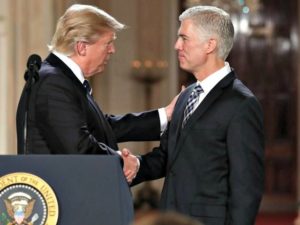by WorldTribune Staff, October 11, 2017
Since taking office, President Donald Trump has submitted 50 candidates to fill judicial vacancies. The Senate, thus far, has confirmed just seven, including Supreme Court Justice Neil Gorsuch.
According to the Judicial Conference of the United States, 149 vacancies currently exist in the federal courts.

“The president’s nominating pace is astoundingly fast compared to recent administrations,” Kevin Daley wrote for The Daily Caller on Oct. 10.
President Barack Obama sent the Senate 10 judicial nominees during his first year in office, including Justice Sonia Sotomayor. President George W. Bush named only four. President Bill Clinton’s only judicial nomination during his first year was Justice Ruth Bader Ginsburg.
Conservative think tanks and advocacy groups including the Heritage Foundation and the Judicial Crisis Network (JCN) have warned that if the Republican-led Senate fails to move on Trump’s nominees, it will forfeit an unprecedented opportunity to reshape the federal courts.
Daley noted that the JCN planned to put $250,000 into a digital advertising campaign in the Washington, D.C. market, urging Senate Majority Leader Mitch McConnell to “abolish procedural rules and traditions allowing Democrats to stymie judicial nominees, or stage marathon confirmation sessions to approve as many nominees as possible.”
McConnell’s office has promised to meet with JCN in the near future.
“The campaign, including the advertising, is in a holding pattern for now because Leader McConnell’s office has reached out and wants to have discussions about how best to proceed in the coming months in order to avoid the kind of judicial confirmations bottleneck that the groups are concerned about,” a spokesman for JCN told Politico.
McConnell told The New York Times last month that he is prepared to do away with blue slips, in which senators representing states where judicial vacancies occur are given some deference as to whether nominees for that seat will proceed. By tradition, the Senate Judiciary Committee will not schedule a hearing for a judicial nominee until the relevant home state senators return blue slips.
“My personal view is that the blue slip, with regard to circuit court appointments, ought to simply be a notification of how you’re going to vote, not the opportunity to blackball,” McConnell said.
Before the confirmation of Judge Ralph Erickson to the 8th U.S. Circuit Court of Appeals, McConnell had criticized Democrats for erecting needless procedural obstacles for consensus nominees.
“As I’ve noted before, the opposition they’ve shown to these nominees most of the time seems to have little to do with the nominees themselves, nor whether or not Democrats even support them – in many cases, our Democratic colleagues actually do support the nominees,” he said. “This has got to stop.”
Erickson was confirmed on a 95-1 vote.
Democratic senators are currently withholding blue slips for several judicial nominees, including 8th Circuit nominee Justice David Stras and 9th Circuit nominee Ryan Bounds, Daley noted.
“There are almost a dozen unfilled appellate vacancies arising from states with at least one Democratic senator,” Daely wrote. “As such, it seems that a final confrontation over blue slips is inevitable.”
Subscribe to Geostrategy-Direct __________ Support Free Press Foundation
